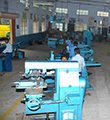
A Diploma in Instrumentation & Control Engineering is a technical program focused on the principles and practices of designing, operating, and maintaining systems that measure and control physical processes. Typically spanning three years, this diploma provides students with a solid foundation in electronics, instrumentation, and control systems, preparing them for various roles in industries such as manufacturing, power generation, and automation. This overview outlines the core subjects, practical components, and career opportunities associated with the program.



The program often includes fieldwork components, such as industrial visits and practical training, to provide students with real-world exposure to instrumentation and control applications.
Students are typically required to undertake project work that involves designing, implementing, and testing instrumentation and control systems. This could include developing a new measurement device, automating a process, or creating a control system for an industrial application.
Many programs incorporate an industrial training or internship component, allowing students to gain hands-on experience in an industrial environment. This exposure is critical for understanding the practical aspects of instrumentation and control engineering.
Depending on the program, students may have the option to choose elective subjects to specialize in specific areas such as: Advanced Process Control, Robotics and Automation, Instrumentation in Biomedical Engineering or Environmental Monitoring and Control.
Design, develop, and maintain instruments and systems for measuring and controlling physical processes.
Implement and manage control systems to ensure optimal performance of industrial processes.
Develop and oversee automated systems in manufacturing and industrial environments.
Optimize and control industrial processes to improve efficiency and quality.
Ensure the proper functioning and maintenance of instrumentation and control equipment.
Provide technical support and services for instrumentation and control systems in the field.
Develop and implement programs for PLCs used in industrial automation.
Perform calibration and testing of instruments and control systems to ensure accuracy and reliability.
Oversee and ensure the quality of processes and products through effective measurement and control systems.
Manage and operate Supervisory Control and Data Acquisition (SCADA) systems for monitoring and controlling industrial processes.
Provide technical expertise in the sale and support of instrumentation and control products.
Lead and manage projects related to instrumentation and control engineering.
Graduates may choose to pursue further education, such as a Bachelor’s degree in Instrumentation Engineering, Control Engineering, or related fields, to enhance their knowledge and career prospects.
Work in government agencies responsible for infrastructure development and public works.
With a solid foundation in instrumentation and control, graduates can also explore opportunities to start their own businesses in areas such as consulting, equipment servicing, or custom automation solutions.
 About Course
About Course
 Course Details
Course Details
 Laboratory Work
Laboratory Work
 Field Work
Field Work
 Project Work
Project Work
 Industrial Training
Industrial Training
 Elective Subjects
Elective Subjects
 Career Opportunities
Career Opportunities








